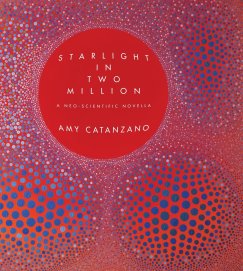 Amy Catanzano
Amy Catanzano
Noemi Press ($15)
by Cindra Halm
Let’s take a journey involving both quantum and cosmic universes, a point of view from “fourth person narration,” characters named for Greek concepts, and metafictional investigations of the human capacity to express in words. And, of course, a time machine.
Amy Catanzano’s Starlight in Two Million: A Neo-Scientific Novella is a mind-full, mine-filled, field of literary, aesthetic, scientific, and imaginative constructs that take forms as collage, cultural allegory, anti-war expression, epistolary conversation, and song-of-joy-in-risk-taking, to list merely a few. Exceedingly specific to its referents, exceedingly rigorous in its intellect, the book might be as intimidating as it is elegant. And yet, plenty of random openings yield trackable, if also mystifying, koan-type passages which may tantalize one’s curious poet of the mind as well as one’s sensual poet of the skin:
The Enduring Karmanaut
When I was born, I was a letter delivered by the sea in a ship crafted with no limit for travel. My fingerprint unlocked a supercivilization behind my throat. My cells write without sight. The ship sailed between the horizon and the sea to the land where I was born. I was born into a letter. My fingerprint was found by a supercivilization. When I was born, the sea unlocked a horizon behind my throat. My paradox will be wider than my cell.
In this full “chapter” of the self-described novella, one may note the iterations that organically mutate meanings by rearranging phrases and ideas as well as by playing with multivalent particular words (“letter,” “cell,” etc.). While each chapter expresses variations of length, look, line, and language, the theme and the strategy of mutability arcs throughout the entire book, highlighting the role that change plays in the novella’s (while commenting on our own) multiverse—a resonant word here if ever there was one, and a form of the title of Catanzano’s previous collection of poems, Multiversal (Fordham University Press, 2009).
So this book is a trip, in all senses of the word. Guides can be found in the four quotations which open the narrative, as well as in the highly recommended “Author’s Statement: An Artificial Intelligence” which closes it. Yes, even if you read theoretical physics for fun, whiz through Sunday crossword puzzles, devour utopian/dystopian literature, and think in highly connotative, simultaneous logics, beginning with the “Author’s Statement” will provide a grounding influence for “my investigation into quantum poetics, a hybrid critical-speculative framework that I am extending upon and developing in this project and others.”
The “Statement,” a manifesto that has delicious potential to spin into a series of essays, brings to mind Alice Fulton’s ideas and illuminations on “fractal poetics” in the book Feeling as a Foreign Language: The Good Strangeness of Poetry (Graywolf, 1999), which definitely seems an influence. One of Catanzano’s explicitly stated ancestors, Alfred Jarry, lends his “science of imaginary solutions” to the text’s exceedingly dense stew of postulates, constructions, references, paradoxes, and shifting cosmologies.
Starlight is a neo-hippie, alternative-future creation myth in which space-time limitations disappear and characters forge ever-developing notions of freedom, responsibility, and relationship, in settings of nowhere and everywhere. Catanzano comes across as a superstring theoretical linguist sensualist geek collagist, with instincts to parse, to layer, and to linger, in dynamic context or in contextual dynamism. A poetic attempt at the elusive Theory of Everything? Her work feels important, and full of wonder for what is and what could be. Scientists and artists share this.
Now, back to the crossword puzzle: word before “dust” and “light”: four letters. “Star,” right? Cue Joni Mitchell. Amy Catanzano also reminds us that we’re comprised of star-stuff, the matter, the energy—but in her version, even outer space is local. We don’t have to get ourselves back to the garden; we never left it.
